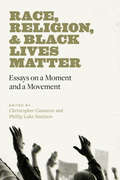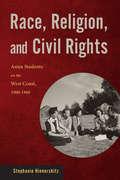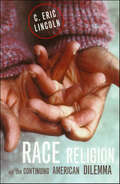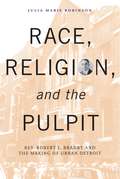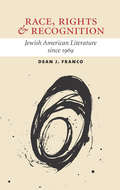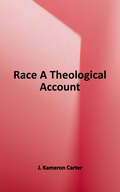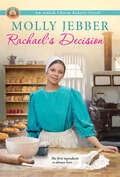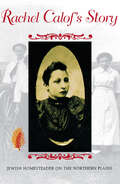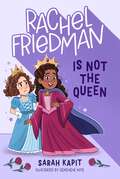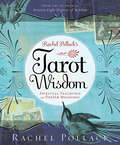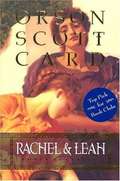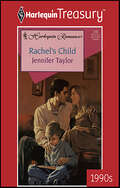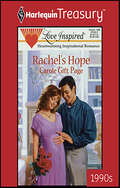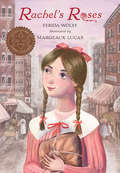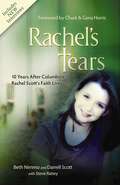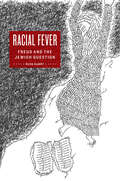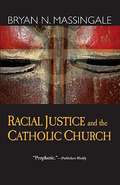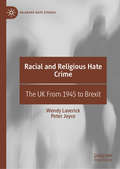- Table View
- List View
Race, Religion, and Black Lives Matter: Essays on a Moment and a Movement (Black Lives and Liberation)
by Christopher Cameron and Phillip Luke SinitiereBlack Lives Matter, like its predecessor movements, embodies flesh and blood through local organizing, national and global protests, hunger strikes, and numerous acts of civil disobedience. Chants like &“All night! All day! We&’re gonna fight for Freddie Gray!&” and &“No justice, no fear! Sandra Bland is marching here!&” give voice simultaneously to the rage, truth, hope, and insurgency that sustain BLM. While BLM has generously welcomed a broad group of individuals whom religious institutions have historically resisted or rejected, contrary to general perceptions, religion neither has been absent nor excluded from the movement&’s activities. This volume has a simple, but far-reaching argument: religion is an important thread in BLM. To advance this claim, Race, Religion, and Black Lives Matter examines religion&’s place in the movement through the lenses of history, politics, and culture. While this collection is not exhaustive or comprehensive in its coverage of religion and BLM, it selectively anthologizes unique aspects of Black religious history, thought, and culture in relation to political struggle in the contemporary era. The chapters aim to document historical change in light of current trends and current events. The contributors analyze religion and BLM in a current historical moment fraught with aggressive, fascist, authoritarian tendencies and one shaped by profound ingenuity, creativity, and insightful perspectives on Black history and culture.
Race, Religion, and Civil Rights: Asian Students on the West Coast, 1900-1968
by Stephanie HinnershitzHistories of civil rights movements in America generally place little or no emphasis on the activism of Asian Americans. Yet, as this fascinating new study reveals, there is a long and distinctive legacy of civil rights activism among foreign and American-born Chinese, Japanese, and Filipino students, who formed crucial alliances based on their shared religious affiliations and experiences of discrimination. Stephanie Hinnershitz tells the story of the Asian American campus organizations that flourished on the West Coast from the 1900s through the 1960s. Using their faith to point out the hypocrisy of fellow American Protestants who supported segregation and discriminatory practices, the student activists in these groups also performed vital outreach to communities outside the university, from Californian farms to Alaskan canneries. Highlighting the unique multiethnic composition of these groups, Race, Religion, and Civil Rights explores how the students' interethnic activism weathered a variety of challenges, from the outbreak of war between Japan and China to the internment of Japanese Americans during World War II. Drawing from a variety of archival sources to bring forth the authentic, passionate voices of the students, Race, Religion, and Civil Rights is a testament to the powerful ways they served to shape the social, political, and cultural direction of civil rights movements throughout the West Coast.
Race, Religion, and the Continuing American Dilemma
by C. Eric LincolnA classic work on religion and the racial problems of modern america -now brought up to date.Since the early days of the Republic, Americans' exuberant, unchastened idealism, their commitment to the notion of a perfect society in the New World, has clashed with the reality of ugly American society, and religious groups have all too often accommodated themselves to these injustices.In Race, Religion, and the Continuing American Dilemma, C. Eric Lincoln reevaluates what Gunnar Myrdal called "the American dilemma" and studies particularly the influence of the black church. This revised edition takes into account the weakening of welfare and affirmative action, and argues that the black church must serve today as a vital moral authority to lead us in to the twenty-first century..
Race, Religion, and the Pulpit: Rev. Robert L. Bradby and the Making of Urban Detroit (Great Lakes Books Series)
by Julia Marie RobinsonDuring the Great Migration of African Americans from the South to the cities of the Northeast, Midwest, and West, the local black church was essential in the making and reshaping of urban areas. In Detroit, there was one church and one minister in particular that demonstrated this power of the pulpit--Second Baptist Church of Detroit ("Second," as many members called it) and its nineteenth pastor, the Reverend Robert L. Bradby. In Race, Religion, and the Pulpit: Rev. Robert L. Bradby and the Making of Urban Detroit, author Julia Marie Robinson explores how Bradby's church became the catalyst for economic empowerment, community building, and the formation of an urban African American working class in Detroit. Robinson begins by examining Reverend Bradby's formative years in Ontario, Canada; his rise to prominence as a pastor and community leader at Second Baptist in Detroit; and the sociohistorical context of his work in the early years of the Great Migration. She goes on to investigate the sometimes surprising nature of relationships between Second Baptist, its members, and prominent white elites in Detroit, including Bradby's close relationship to Ford Motor Company and Henry Ford. Finally, Robinson details Bradby's efforts as a "race leader" and activist, roles that were tied directly to his theology. She looks at the parts the minister played in such high-profile events as the organizing of Detroit's NAACP chapter, the Ossian Sweet trial of the mid-1920s, the Scottsboro Boys trials in the 1930s, and the controversial rise of the United Auto Workers in Detroit in the 1940s. Race, Religion, and the Pulpit presents a full and nuanced picture of Bradby's life that has so far been missing from the scholarly record. Readers interested in the intersections of race and religion in American history, as well as anyone with ties to Detroit's Second Baptist Church, will appreciate this thorough volume.
Race, Rights, and Recognition: Jewish American Literature since 1969
by Dean J. FrancoIn Race, Rights, and Recognition, Dean J. Franco explores the work of recent Jewish American writers, many of whom have taken unpopular stances on social issues, distancing themselves from the politics and public practice of multiculturalism. While these writers explore the same themes of group-based rights and recognition that preoccupy Latino, African American, and Native American writers, they are generally suspicious of group identities and are more likely to adopt postmodern distancing techniques than to presume to speak for "their people." Ranging from Philip Roth's scandalous 1969 novel Portnoy's Complaint to Gary Shteyngart's Absurdistan in 2006, the literature Franco examines in this book is at once critical of and deeply invested in the problems of race and the rise of multicultural philosophies and policies in America.Franco argues that from the formative years of multiculturalism (1965-1975), Jewish writers probed the ethics and not just the politics of civil rights and cultural recognition; this perspective arose from a stance of keen awareness of the limits and possibilities of consensus-based civil and human rights. Contemporary Jewish writers are now responding to global problems of cultural conflict and pluralism and thinking through the challenges and responsibilities of cosmopolitanism. Indeed, if the United States is now correctly-if cautiously-identifying itself as a post-ethnic nation, it may be said that Jewish writing has been well ahead of the curve in imagining what a post-ethnic future might look like and in critiquing the social conventions of race and ethnicity.
Race: A Theological Account
by J. Kameron CarterThis groundbreaking monograph promises to open a new chapter in black theology. J. Kameron Carter argues that black theology's intellectual impoverishment in the Church and the academy is the result of its theologically shaky presuppositions, which are based largely on liberal Protestantconvictions. He critiques the work of such noted scholars as Albert Raboteau, Charles Long and James Cone, and argues that black theology must rebuild itself on completely new theological foundations. He lays these foundations by means of a remarkable synthesis between African-American religioushistory and Christian orthodoxy. Carter urges black theologians to look back beyond the Enlightenment and the rise of race theory, and to bring patristic Christology into conversation with the modern construction of race and being. He himself draws primarily on the writings of Irenaeus of Lyons,Gregory of Nyssa, and Maximos the Confessor in constructing his innovative Christology.
Rachael's Decision (The Amish Charm Bakery #6)
by Molly JebberSet in a close-knit Amish community in 1900s Ohio, award-winning author Molly Jebber&’s historical romance brims with authentic detail and an emotionally complex storyline—a treat both for historical fans and those who enjoy wholesome romance by writers like Charlotte Hubbard, Rachel J. Good, Amy Lillard, and Jennifer Beckstrand.In 1915 Ohio, anyone entering the Amish Charm Bakery is greeted by the sweet warmth and delicious fragrance of cinnamon and vanilla wafting from freshly baked cookies and pies. And newcomers to this Amish community will find friendship on the menu, too—and perhaps for a lucky few, even lasting love . . . Rachael Schlabach&’s first chance for a husband ended in a tragic accident that left her with a limp. Though happy to work in the beloved Amish Charm Bakery, she hasn&’t abandoned her romantic dreams, but she has focused on a widower with two adorable kinner she would love to raise as her own. Then handsome, single Caleb Yutzy arrives on the scene . . . Caleb is eager to court pretty, warm-hearted Rachael, and tells her so. But their frank conversations reveal a truth that dashes her hopes—Caleb very much wants kinner, the one thing Rachael can&’t give him. Even when Caleb assures her it&’s no matter, she can&’t bring herself to be so selfish. Yet love is beyond all planning, and with faith Rachael and Caleb may discover the lifetime of love they were meant to share . . .
Rachel Calof's Story: Jewish Homesteader on the Northern Plains
by Rachel Calof"Calof's [story] has the 'electricity' one occasionally finds in primary sources. It is powerful, shocking, and primitive, with the kind of appeal primary sources often attain without effort. . . . it is a strong addition to the literature of women's experience on the frontier." —Lillian SchlisselIn 1894, eighteen-year-old Rachel Bella Kahn travelled from Russia to the United States for an arranged marriage to Abraham Calof, an immigrant homesteader in North Dakota. Rachel Calof's Story combines her memoir of a hard pioneering life on the prairie with scholarly essays that provide historical and cultural background and show her narrative to be both unique and a representative western tale. Her narrative is riveting and candid, laced with humor and irony.The memoir, written by Rachel Bella Calof in 1936, recounts aspects of her childhood and teenage years in a Jewish community, (shtetl) in Russia, but focuses largely on her life between 1894 and 1904, when she and her husband carved out a life as homesteaders. She recalls her horror at the hardships of pioneer life—especially the crowding of many family members into the 12 x 14' dirt-floored shanties that were their first dwellings. "Of all the privations I knew as a homesteader," says Calof, "the lack of privacy was the hardest to bear." Money, food, and fuel were scarce, and during bitter winters, three Calof households—Abraham and Rachel with their growing children, along with his parents and a brother's family—would pool resources and live together (with livestock) in one shanty.Under harsh and primitive conditions, Rachel Bella Calof bore and raised nine children. The family withstood many dangers, including hailstorms that hammered wheat to the ground and flooded their home; droughts that reduced crops to dust; blinding snowstorms of plains winters. Through it all, however, Calof drew on a humor and resolve that is everywhere apparent in her narrative. Always striving to improve her living conditions, she made lamps from dried mud, scraps of rag, and butter; plastered the cracked wood walls of her home with clay; supplemented meagre supplies with prairie forage—wild mushrooms and garlic for a special supper, dry grass for a hot fire to bake bread. Never sentimental, Caolf's memoir is a vital historical and personal record.J. Sanford Rikoon elaborates on the history of Jewish settlement in the rural heartland and the great tide of immigration from the Russian Pale of Settlement and Eastern Europe from 1880–1910. Elizabeth Jameson examines how Calof "writes from the interior spaces of private life, and from that vantage point, reconfigures more familiar versions of the American West." Jameson also discusses how the Calofs adapted Jewish practices to the new contingencies of North Dakota, maintaining customs that represented the core of their Jewish identity, reconstructing their "Jewishness" in new circumstances.
Rachel Friedman Breaks the Rules (Rachel Friedman #1)
by Sarah KapitIntroducing a charming chapter book series starring Rachel Friedman, a sweet and silly Jewish girl renowned for her peanut butter challah baking skills and larger-than-life personality!Rachel loves being Jewish, but she hates following the rules at synagogue—and everywhere else. To encourage her to see the value of rules, Rachel and her father strike a deal: If Rachel can stick to the rules for one whole week, she can go to a meet and greet for her favorite gymnast!But when Rachel finds herself in a tricky situation that forces her to choose between following the rules or doing what she believes is right, she learns that some rules are worth breaking. And yet, when the consequences of her rule breaking spin out of control, she learns that some rules are still worth following.Sarah Kapit creates a refreshing chapter book heroine in Rachel Friedman, featuring her identity, ADHD, and personality with care. The book also features Genevieve Kote's adorable illustrations throughout.
Rachel Friedman Is Not the Queen (Rachel Friedman)
by Sarah KapitIn this heartwarming chapter book, Rachel celebrates Purim—and learns the joy of sharing the stage.Rachel is so excited about Purim, and she's especially excited to star in her Hebrew school's Purim spiel! She'll get to dress up like a queen and put on a play in front of everyone.But when her teacher announces the cast, Rachel doesn't get the leading role of Queen Esther—her best friend Maya does! Rachel has to learn how to step aside and let someone else be the star of the show in this laugh-out-loud story about friendship.
Rachel Friedman and Eight Not-Perfect Nights of Hanukkah (Rachel Friedman #2)
by Sarah KapitJoin our hilarious Jewish heroine as she embarks on a quest to reignite her family's Hanukkah spirit in the second book of this chapter book series.Rachel is determined to make this the happiest Hanukkah ever. She's carefully planned eight awesome activities for eight perfect nights. But her brother Aaron insists on being a Hanukkah humbug, and his attitude threatens to ruin the holiday. When Aaron’s grumpiness leads to a big accident, Rachel has to figure out how to save her family’s Hanukkah from disaster. Rachel has plenty of determination, creativity, and holiday spirit—will it be enough to restore the joy of Hanukkah?
Rachel Pollack's Tarot Wisdom: Spiritual Teachings and Deeper Meanings
by Rachel PollackBeloved by nearly half a million Tarot enthusiasts, Rachel Pollack's Seventy-Eight Degrees of Wisdom forever transformed the study of Tarot. This much-anticipated follow-up to Pollack's classic guidebook will inspire Tarot aficionados and inform a new generation of Tarot students. Enhanced by the author's personal stories and insights gained over the past three decades, this book on tarot invites you on a fascinating and fun adventure.Offering an abundant array of new ideas mixed in with enlightening discussions about Tarot's checkered past, this tarot guidebook features innovative ways to interpret and use Tarot, and a wealth of original spreads to try for yourself—including spreads for predictive, psychological, magical, and spiritual readings. All seventy-eight cards are explored from fresh angles: history, art, psychology, and a variety of spiritual and occult traditions, using cards from seven diverse decks so you can easily contrast and compare. No matter where your starting point on the path of personal discovery, this tarot book will prove a trusted companion for your journey.
Rachel and Leah (Women of Genesis #3)
by Orson Scott Card3rd in Card's Women of Genesis series. This book tells the first part of the story of Rachel and Leah, wives to Jacob.
Rachel's Child
by Jennifer TaylorHer lie came back to haunt her...Ten years ago Rachel and Stephen had had an affair-and the result was little Jamie. For reasons of her own, Rachel had told Stephen that Jamie was someone else's child. But when Rachel finally admitted Stephen was the father, he wouldn't believe her. He was convinced Rachel was a conniving, scheming woman who would go to any lengths to get what she wanted-and she appeared to want Stephen. Perhaps it wasn't a case of what Rachel wanted at all, but what Jamie needed-a dad!Jennifer Taylor "is sure to touch each and every heart in a unique but fierce way."-Affaire de Coeur
Rachel's Contrition: A Novel
by Michele BuckmanRachel Winters had nothing, won it all, and then lost everything. After the death of her daughter, grief and delusions caused Rachel to lose her husband, her home, and custody of her young son. Help arrives from two very unexpected sources: Lilly, a young teen who is battling her own demons, and a holy card with the picture of St. Thérèse of Lisieux. As Rachel grows close to Lilly and starts to understand the message of Therese, she gradually comes to accept the past and find peace.
Rachel's Dream (Hope Chest of Dreams #3)
by Lisa Jones BakerThe treasures within her hand-carved hope chest help a young Amish woman find her heart&’s desire in this novel from the author of Annie&’s Recipe. Rachel Kauffman and Jarred Zimmerman seem to have nothing in common. She&’s the outgoing youngest of a large, close-knit Amish clan, and longs to raise a brood of her own near those she loves. Estranged from his family by tragedy, Jarred is a young veterinarian who trusts the animals he heals far more than he trusts people. However, when Rachel&’s beloved horse falls ill, Jarred&’s struggles to save him show Rachel he&’s a man who cares deeply. And the respect he feels for her gentle warmhearted ways soon becomes an irresistible bond . . . When Rachel tries to help Jarred reunite with his parents, it is an unexpected blessing—with one complication. If he takes this chance to put his past to rest, it could separate him and Rachel for good. Now, with prayer, love—and her hope chest&’s small miracles—Jarred and Rachel must find the courage to reconcile their wishes into a joyous life together.Praise for the Hope Chest of Dreams series &“Written with tenderness and simplicity.&” —Joan Wester Anderson, New York Times–bestselling author&“A story of faith, love and lifelong friendship . . . If you enjoy Amish fiction, you need to add Lisa Jones Baker to your &‘to be read&’ list.&” —The Book Connection . . . &“Baker lays the familiar groundwork of a close-knit Amish community, but the heart of this romance goes far beyond stereotypes.&” —Publishers Weekly, starred review
Rachel's Garden (Pleasant Valley #2)
by Marta PerryThe next in a series of Amish-set novels in which a woman's close- knit community helps her through challenging times. It has been almost a year since the Amish community of Pleasant Valley lost Ezra Brand to tragedy. <P><P>Now his wife Rachel struggles to raise their three children and run their farm. Rachel's friends and family have come forward to help. But all of their constant advice, however well intentioned, puts undue pressure on Rachel. And when Gideon Zook, Ezra's best friend, asks her permission to build the greenhouse Ezra had always promised her, she finds his presence too painful a reminder of losing her husband. As spring turns to summer, and Rachel puts her heart into growing the plants that have always brought her joy, can she discover the courage to embrace new beginnings?
Rachel's Hope
by Carole Gift PageA BABY ON THE WAY...Pregnant? Rachel Webber was stunned by the news. She had a thirteen-year-old son-and never expected more. But the joy she felt for her unborn child was tempered by the realization that her husband might not share her happiness.Lately, David seemed distant. It was as if something had come between them in their once-perfect marriage. Yet as Rachel recalled the thrill of their son's birth-the tender closeness she and her husband had shared then-this mother-to-be knew God had sent her and David a priceless gift.Would this blessed event restore their precious love...and make them a family again?
Rachel's Prayer (Country Road Chronicles #2)
by Leisha KellyNothing has been the same for Samuel and Julia since the attack on Pearl Harbor in 1941. All around them young men are enlisting for the service, leaving the safety of the rural community that has sheltered the Wortham family since the Great Depression. Now their own beloved son Robert has gone to fight for his country, along with three of the Hammond boys. Julia’s heart aches for the boys while Robert’s girlfriend, Rachel Gray, offers a prayer that changes the lives of all who hear it. Those left behind struggle to find their place and God’s plan amidst the chaos of war. As the letters from Robert and the Hammond boys slow to a stop, can those at home find God’s peace?
Rachel's Roses
by Ferida WolffRachel Berger needs twenty-five cents to make her dream come true. But for Rachel, twenty-five cents is a fortune--and she's running out of time.Third-grader Rachel Berger longs to be different. At the very least, she'd like to be set apart from her copycat little sister, Hannah. The second Rachel spots the glass rose buttons at Mr. Solomon's button shop, her heart stops. They'll be the perfect, unique touch on the skirt her mother is making her for Rosh Hashanah. There's just one problem: Rachel can't afford them. With her focus set on earning enough to buy them before the holiday, will Rachel lose sight of what's really important?Themes of sisterhood, sibling rivalry, and strong family values are organically woven in to this charmingly illustrated chapter book set on the Lower East Side of Manhattan in the early twentieth century.
Rachel's Secret (The Riverhaven Years, Book #1)
by B. J. HoffRACHEL BRENNEMAN HAS A SECRET . . . But when wounded Irish American riverboat captain Jeremiah Gant bursts into the rural Amish setting of Riverhaven, her secret must come out. The suspicious Englischer brings chaos and conflict to the community--especially for Rachel. The unwelcome "outsider" needs a safe place to recuperate before continuing his role as an Underground Railroad conductor. Neither he nor Rachel is prepared for the forbidden love that threatens a man's mission, a woman's heart, and a way of life for an entire people.
Rachel's Tears: The Spiritual Journey of Columbine Martyr Rachel Scott
by Beth NimmoThe Columbine tragedy in April 1999 pierced the heart of our country. In December 1999, we learned that the teenage killers specifically targeted Rachel Scott and mocked her Christian faith on their chilling, homemade videotapes. Rachel Scott died for her faith. Now her parents talk about Rachel's life and how they have found meaning in their daughter's martyrdom in the aftermath of the school shooting. Rachel's Tears comes from a heartfelt need to celebrate this young girl's life, to work through the grief and the questions of a nation, and to comfort those who have been touched by violence in our schools today. Using excerpts and drawings from Rachel's own journals, her parents offer a spiritual perspective on the Columbine tragedy and provide a vision of hope for preventing youth violence across the nation.
Racial Fever: Freud and the Jewish Question
by Eliza SlavetWhat makes a person Jewish? Why do some people feel they have physically inherited the memories of their ancestors? Is there any way to think about race without reducing it to racism or to physical differences?These questions are at the heart of Racial Fever: Freud and the Jewish Question. In his final book, Moses and Monotheism, Freud hinted at the complexities of Jewishness and insisted that Moses was really an Egyptian. Slavet moves far beyond debates about how Freud felt about Judaism; instead, she explores what he wrote about Jewishness: what it is, how it is transmitted, and how it has survived. Freud’s Moses emerges as the culmination of his work on transference, telepathy, and intergenerational transmission, and on the relationships between memory and its rivals: history, heredity, and fantasy. Writing on the eve of the Holocaust, Freud proposed that Jewishness is constituted by the inheritance of ancestral memories; thus, regardless of any attempts to repress, suppress, or repudiate Jewishness, Jews will remain Jewish and Judaism will survive, for better and for worse.
Racial Justice and the Catholic Church
by Bryan N. MassingaleRacial Justice and the Catholic Church examines the presence of racism and the resources within Catholic teaching and within the black experience, particularly the work of Martin Luther King, Jr. that can combat it and promote reconciliation and justice.
Racial and Religious Hate Crime: The UK From 1945 to Brexit (Palgrave Hate Studies)
by Peter Joyce Wendy LaverickThis book focuses on two key aspects of hate crime in the UK since 1945: those motivated by racial and religious prejudices. It examines factors that have underpinned the emergence and occurrence of racial and religious hate crime and the approaches and policies that have been pursued by the state, especially the criminal justice system, to combat this problem. Crucially, it also provides insight into the challenges that are faced in the contemporary period (especially in the wake of the 2016 EU referendum) in combatting hate crime. Additionally the book briefly considers the importance of the rhetoric of the Trump campaign and the administration's early policies to the contemporary manifestations of racial and religious hate crime.
